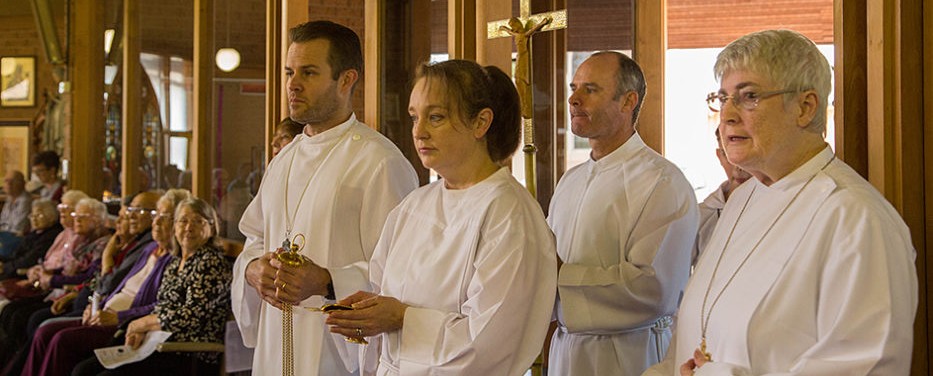Instituted Lectors and Acolytes
National Liturgical Council

In mid-January 2021, Pope Francis (Spiritus Domini) adjusted Canon Law to allow women to be instituted as Lectors and Acolytes, making it clear that these lay ministries are based on the baptismal priesthood and are quite distinct from the ordained ministry. They are rooted in Baptism, not Orders.
From 1972, Pope Paul VI went to some trouble to articulate the relationship between instituted Lector and lay reader, between instituted Acolyte and lay communion minister:
♦The instituted Lector not only reads the scriptures but has greater oversight of the Liturgy of the Word, trains lay readers and takes part in sacramental preparation. Thus he was expected to study and meditate on the word of God.
♦The instituted Acolyte not only helps with the distribution of holy communion inside and outside the liturgy, but is involved in a broader ministry of the altar and in training lay ministers of communion. He was to devote himself to a deeper understanding and care for the Eucharist. In practice, this often seemed to embrace the duties of a senior server and sacristan.
Lay men and women have universally exercised the ministries of reading the scriptures and assisting with the distribution of holy communion. Now that the Church is revisiting the formal instituted ministry of Lector and Acolyte, it is important to review their place in the local Church so that they will exist harmoniously with lay readers and lay ministers of communion. Indeed, rather than supplanting the existing lay ministries, the institution of lay ministries serves to articulate the common baptismal lay ministry of all by giving it stability, formal public and ritual recognition, and episcopal approbation. Instituted ministries are not to suppress but rather enhance other lay ministries; they are not to be seen as forming part of a hierarchical structure.
In defining the role of an instituted minister, it is important to see how it is an extension of the lay ministry. What extra does the role of Lector include that is not part of the lay ministry of reader? What extra does the role of Acolyte include that is not part of the lay ministry of communion minister?
The role of a lay READER includes the following:
♦ Praying with the Scriptures;
♦ Preparing the Scripture texts: Break Open the Word;
♦ Learning the techniques of proclamation;
♦ Proclaiming the Scriptures in the liturgy.
(see General Instruction of the Roman Missal 101)
Extra roles for an instituted LECTOR may include some of the following:
♦ Discerning and encouraging those who have a gift for the ministry of the word;
♦ Training and formation of lay readers;
♦ Providing formation on the word, including scripture groups and Lenten groups;
♦ Leading lectio divina in the parish;
♦ Leading the Liturgy of the Word and the Prayer of the Church;
♦ Preaching;
♦ Preparing the Prayer of the Faithful;
♦ Co-ordinating or leading Children’s Liturgy of the Word on Sunday;
♦ Contributing to the RCIA by helping catechumens in the study of the Sunday Readings and guiding them when they are dismissed from the Mass;
♦ Being involved in the sacramental preparation of children;
♦ Being a member of the baptismal preparation team which prepares parents for the baptism of their children;
♦ Renewing the ministry of the word within the parish community.
(see General Instruction of the Roman Missal 99, 194-198)
The role of a lay COMMUNION MINISTER includes the following:
♦ Distributing holy communion at Mass;
♦Taking communion to the sick in their homes;
♦ Bringing holy communion to those in hospitals or nursing homes.
(see General Instruction of the Roman Missal 100)
Extra roles for an instituted ACOLYTE may include some of the following:
♦ Training and formation of lay communion ministers;
♦ Organising ministers for bringing communion to the sick in their homes;
♦ Organising ministers for bringing communion to those in hospitals and nursing homes;
♦ Training and co-ordinating altar servers;
♦ Leading Liturgy of the Word and the Communion or Sunday Celebrations in the absence of a priest;
♦ Forming the community in eucharistic living (e.g. Eucharist and Social Justice);
♦ Fostering eucharistic devotion in the parish;
♦ Taking the role of MC at major parish liturgies (e.g. Easter Vigil);
♦ Taking the role of sacristan / preparing the altar and the sacred vessels for liturgy;
♦ Preparing thurible when incense is to be used;
♦ Preparing children for First Communion;
♦ Being a member of the baptismal preparation team which prepares parents for the baptism of their children.
(see General Instruction of the Roman Missal 98, 187-193)
